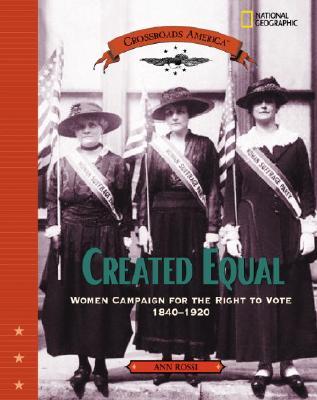However, a lot of my students wrinkle up their noses at nonfiction. I've had more luck with it this year, especially (and I hate to say this) thanks to Accelerated Reader. Some teachers require students to have two points of nonfiction for their AR goal (out of ten, usually). Students have started to pick up half point books and rather enjoy them. Still, it's hard to find just the right combination of elements that will appeal to reluctant nonfiction readers. Since nonfiction books can run $25 each, I hate it when I purchase something that stays on the shelf. Here are some thoughts.
 Rossi, Ann. Created Equal: Women Campaign for the Right to Vote 1840 - 1920
February 1st 2005
by National Geographic Children's Books
Rossi, Ann. Created Equal: Women Campaign for the Right to Vote 1840 - 1920
February 1st 2005
by National Geographic Children's BooksThis had 40 pages, and the text was interspersed with pictures and side bars in an attractive way. The book followed the women's suffrage movement very linearly, and included primary sources. It had a lot of human interest in that it profiled prominent leaders and explained their experiences. I really liked this. I could get a copy for $11.60, but there are two things stopping me: this isn't really a topic in our curriculum, and the book does not have an AR test. Argh. If other books in this series do have tests and go with our curriculum, I will buy.
Unfortunately, it would just sit on the shelf.
 Marcovitz, Hal. The 1960s.
Marcovitz, Hal. The 1960s. December 1st 2012 by Referencepoint Press
This came in at 90 pages and had huge blocks of uninterrupted text, which was oddly heavy and small. It covered a wide range of topics briefly, including a chapter on "The Pursuit of American Exceptionalism". There are pictures and maps, but I found the text to be rather dry. This had lots of good information and would be used for research, but I didn't find it to be engaging. I have a class doing readings on this era as background to The Outsiders, but I don't think they would pick this up. What I would like instead would be a 40 page book just on space exploration, or the Cold War, or home front feelings about the Vietnam Conflict.Well illustrated and fun. That, the students would read.
 Woog, Adam. The Roman Colosseum.
Woog, Adam. The Roman Colosseum.August 1st 2013 by Referencepoint Press
This is done in the same style as The 1960s. The difference is that I do have students doing research papers on the Colosseum, and this has a lot of in depth information just about one structure. It wouldn't be as good for pleasure reading, but I was impressed that it even included "plants of the Colosseum". I've seen a lot of overviews of Ancient Rome that don't give enough information, but this was very complete. I think ideally I would like a book just on the Colosseum done in the National Geographic style-- something that could be used for both research and pleasure reading, but I may buy this for research purposes.
The search continues. I do try to get the most use out of taxpayer dollars. Thankfully, I was able to check all three of these books out of the Westerville Public Library. They also let me have old encyclopedias, which we use A LOT!!!
Here's the thing. I never THINK I like nonfiction, but when it comes right down to it, if it's well-written, I LOVE it. I think this is probably pretty much the same for our students. They don't THINK they like it. The trick is getting them to give it a chance, The pairing idea seems to work well.
ReplyDeleteI have found some reluctant readers will hook onto non-fiction quicker than fiction. If the topic is one they adore, they're hooked. Thanks for featuring these three titles.
ReplyDelete